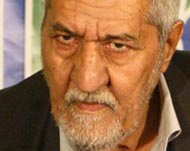US, Sunni interests converge in Iraq?
Sunni Arab leaders in Iraq have voiced caution over a thawing in relations with the United States following recent conciliatory remarks by the American ambassador.

Zalmay Khalilzad, the ambassador, said on Sunday that US officials were involved in talks with rebel fighters, the day after he vowed that the US would not keep permanent bases in Iraq.
And with victorious parties yet to agree on the government’s makeup after December’s election, Khalilzad said he opposed sensitive portfolios going to “sectarian” politicians and lamented allegedly Shia-led death squads.
“We have dialogue with the gunmen who want the interests of Iraq and the good of the country,” he told the pan-Arab Al-Hayat newspaper.
“Those gunmen have some comments on the government and our presence, and we say to them that we do not want a permanent war,” he said.
On Saturday, Khalilzad told Iraqi television that “we have no goal of establishing permanent bases here.”
Khalilzad, a Muslim, took over as US ambassador from John Negroponte in June last year.
Precarious situation
But while some Sunnis said Khalilzad’s declarations constituted a watershed in US policy, others maintained the comments were simply the result of a “convergence of interests” given the precarious situation in Iraq.
The aftermath of the US-led invasion of 2003 saw the rise to power of Iraq’s majority Shia, long-oppressed under deposed leader Saddam Hussein whose regime, and those before, favoured the minority Sunnis.
 |
|
Adnan Dulaimi dismissed US |
As a result, disenchanted Sunni Arabs now form the backbone of fighting which has killed more than 2300 US troops and many more Iraqis.
Saleh al-Motlaq, the Sunni Arab politician, said: “There is a change in the American strategy and a greater understanding since the arrival of ambassador Zalmay Khalilzad.”
Motlaq heads the secular National Dialogue Front which has 11 seats in the 275-member parliament.
“The solution is in the hands of the United States,” Motlaq said, deploring Washington’s “sectarian” policies which upset Iraq’s delicate ethnic balance.
“We need those who have perturbed the equilibrium to take a courageous decision to reestablish this equilibrium,” he said.
The Americans should “agree with elements of the resistance for them to come back to politics” to allow “the formation of a real government of national unity,” Motlaq said.
“I think the Americans are serious this time,” he said.
But Adnan Dulaimi, whose Sunni-led National Concord Front has 44 seats in parliament, says the Americans are “only out for their own interests”.
“The reconciliation is simply the result of a convergence of interests,” he said.
US policy unclear
Salim Abdullah, a senior member of the Sunni Iraqi Islamic Party, cautioned that US policy in Iraq was “not yet clear”.
|
US policy in Iraq was “not yet clear. Their projects are not mature and their points of view are sometimes contradictory” Salim Abdullah, senior member, |
“Their projects are not mature and their points of view are sometimes contradictory,” he said.
“To get out of the embarrassing situation they’ve put themselves in, the Americans are turning to us, responding to our demands and talking to armed movements,” said MP Abdullah, lamenting what he called a lack of a US “strategic” vision in Iraq.
Sunni Mithal al-Alusi, sole deputy for the liberal National Party, said he was observing the perceived change in US attitude with “a lot of prudence”, adding that Washington should “clarify its position”.
“The moment has come for a sincere dialogue between the United States and Iraq opening the way to a real participation,” said Alusi, deploring the fact that the political scene is currently dominated by “sectarian Sunni and Shia parties” to the detriment of secular groups.